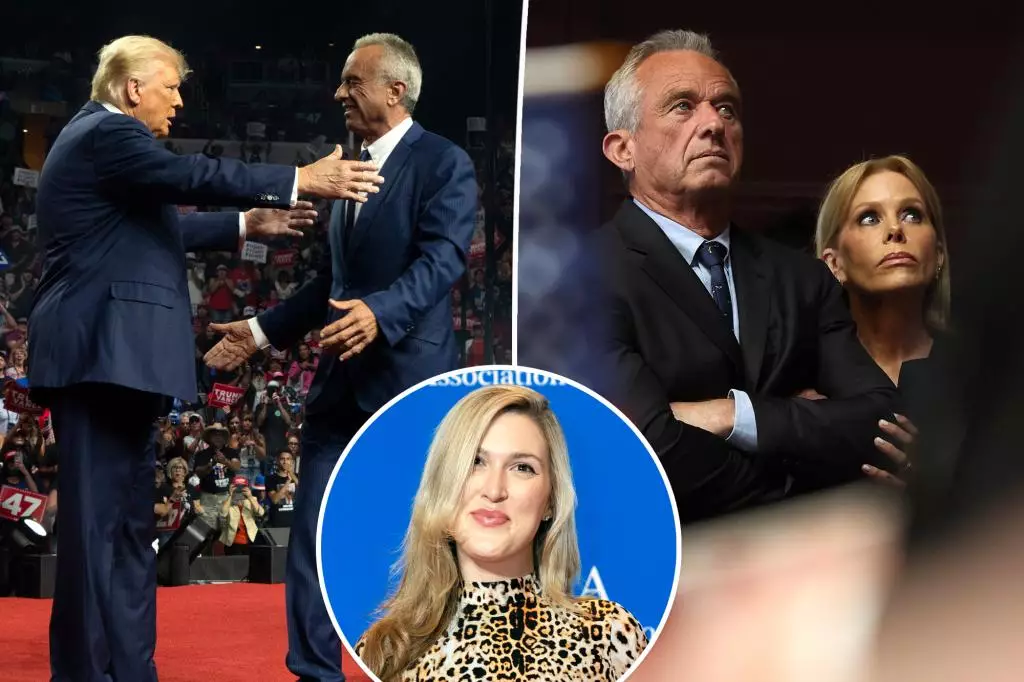In today’s rapidly evolving political landscape, personal scandals can have profound implications for one’s career trajectory, particularly within the frameworks of power in Washington, D.C. A recent controversy involving Robert F. Kennedy Jr. illustrates this phenomenon, as allegations of extramarital affairs have surfaced, potentially jeopardizing his prospects within the Trump administration. This article delves into the intricacies of these allegations, the political environment surrounding them, and the broader implications for Kennedy’s future in politics.
Robert F. Kennedy Jr. has emerged as a polarizing figure in contemporary politics, known both for his controversial views on vaccination and his familial legacy. Recent reports indicate that Kennedy is entangled in a scandal involving romantic relationships with multiple women, including notable allegations stemming from a purported connection with New York Magazine journalist Olivia Nuzzi. The revelation has sparked discussion not only about the ethical dimensions of such relationships but also about how these personal matters intersect with political ambitions.
Despite the scandal, many insiders suggest that Kennedy’s prospects within a potential Trump administration remain intact. Political sources have indicated that in the current political climate, these types of scandals may not carry the weight they once did. One source remarked, “In D.C., this is barely a scandal,” highlighting a shift in the political psyche that allows for a greater tolerance of personal indiscretions.
Historically, political scandals have had devastating effects on careers, often leading to resignations or diminished public trust. However, the current political discourse suggests a marked shift. As one GOP insider noted, “We are not the party of George W. Bush anymore… we are no longer policing what people do in their bedrooms.” This evolution within the party reflects a broader societal trend where personal lives often take a backseat to public policies and political agendas.
This leniency raises questions about the values espoused by political parties today. The public’s growing disinterest in personal scandals may reflect a desire for authentic political engagement that prioritizes issues over character assessments. For many within the Trump camp and the broader GOP sphere, Kennedy’s alleged affair is not likely to hinder his role within a Trump administration, suggesting that the focus remains steadfastly on winning rather than personal morality.
Kennedy’s endorsement of Donald Trump following his departure from the presidential race suggests a calculated political move, consolidating his position within the Republican Party despite the scandal surrounding him. Yet, concerns linger regarding the far-reaching consequences of his alleged affairs. Some insiders have suggested the potential for security concerns tied to his relationship dynamics, with fears that such personal entanglements could expose him to blackmail or compromise. Nevertheless, many contend that significant roles within the administration can be executed without requiring security clearance, particularly in areas related to public health, an arena where Kennedy’s background is particularly relevant.
Moreover, the unfolding narrative regarding Kennedy’s marriage to actress Cheryl Hines introduces additional layers to this saga. Hines’s reported frustration over Kennedy’s relationships and his political affiliations poses potential challenges for his personal life, which increasingly appears intertwined with his political ambitions. Should public scrutiny mount, Kennedy may find himself grappling with dual pressures from both the political and personal fronts.
Kennedy’s situation is emblematic of a broader trend in American politics, where individual scandals intersect with party politics in unexpected ways. The historical precedent set by former President Trump, who has faced numerous allegations of infidelity and misconduct, indicates a potential normalization of such controversies within the political sphere. Despite his various legal entanglements, Trump remains a formidable figure within the GOP, suggesting that personal conduct may not overshadow political viability.
Kennedy finds himself in a precarious but strategically advantageous position as he navigates these complexities. His past, marked by both passionate advocacy and personal demons, mirrors the dichotomy faced by many contemporary political figures. The implications of his situation extend beyond individual reputation; they also inform the evolving landscape of political ethics and the boundaries of acceptable behavior within the corridors of power.
As the political landscape in Washington continues to evolve, the intersection of personal scandal and public service remains a focal point of discussion. Kennedy’s circumstances illuminate the reality that, while personal indiscretions may attract attention, the political ramifications often hinge on a variety of factors, from party loyalty to public perception. For Kennedy, as well as for his contemporaries, the challenge lies in navigating these turbulent waters as they endeavor to maintain their positions amid a shifting tide of political priorities. The outcome of this scandal may ultimately redefine not only Kennedy’s future but also the standards to which political figures are held in the changing realities of American governance.

